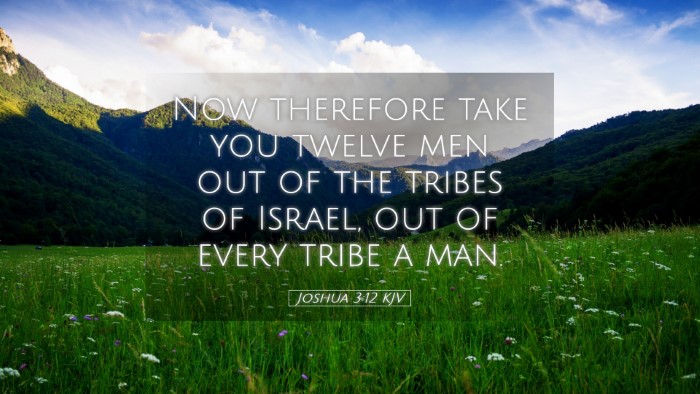Old Testament
Genesis Exodus Leviticus Numbers Deuteronomy Joshua Judges Ruth 1 Samuel 2 Samuel 1 Kings 2 Kings 1 Chronicles 2 Chronicles Ezra Nehemiah Esther Job Psalms Proverbs Ecclesiastes Song of Solomon Isaiah Jeremiah Lamentations Ezekiel Daniel Hosea Joel Amos Obadiah Jonah Micah Nahum Habakkuk Zephaniah Haggai Zechariah MalachiJoshua 3:12
Joshua 3:12 KJV
Now therefore take you twelve men out of the tribes of Israel, out of every tribe a man.
Joshua 3:12 Bible Commentary
Commentary on Joshua 3:12
Joshua 3:12 states: "Now therefore take you twelve men out of the tribes of Israel, out of every tribe a man." This verse is pivotal in the context of the Israelites' impending crossing of the Jordan River into the Promised Land. The act of selecting twelve men serves as a significant moment of organization and representation for the nation of Israel.
Contextual Background
The crossing of the Jordan represents a formidable transition for the Israelites, who had wandered in the wilderness for forty years. Joshua, taking leadership from Moses, initiates a well-coordinated plan under divine instruction to ensure that the people proceed safely and with the assurance of God's presence.
Matthew Henry emphasizes that this command demonstrates God's method of working through appointed leaders and individuals, highlighting God's orderliness and the necessity of representation within the community.
Significance of the Number Twelve
Representation: The choice of twelve men, one from each tribe, symbolizes the unity and collective identity of Israel. According to Adam Clarke, this selection denotes God’s desire to ensure that every tribe has its part in the miraculous event that is about to unfold. This inclusion reinforces the idea that God’s covenant is with the entire nation rather than only specific groups.
Connection to the Twelve Tribes: The number twelve also serves to remind the Israelites of their history and heritage, reinforcing that they are the fulfillment of God's promise to their forefathers. Albert Barnes indicates that each representative would carry the weight of their tribe’s history and destiny as they stand at the threshold of a new beginning.
Leadership and Responsibility
This selection process highlights the importance of leadership and the responsibility that comes with it. Matthew Henry notes that these twelve chosen men would not only witness God's miracle but also serve as witnesses to relay the story of God’s faithfulness to succeeding generations.
Adam Clarke offers insights into the symbolic nature of leadership within Israel, which was rooted in accountability. By selecting leaders from every tribe, Joshua ensures that each tribe has a voice and responsibility in the community’s spiritual journey. This act underscores the need for strong leadership, particularly in divine matters.
Application for Today’s Church
Inclusivity in Leadership: The example set in Joshua 3:12 encourages present-day ecclesiastical structures to echo the principle of inclusiveness within their leadership. Just as every tribe was represented, the modern church should strive to ensure diversity and representation within its leadership to reflect the body of Christ.
Faithful Witnesses: The concept of being witnesses resonates through time. Those in positions of leadership today are called to bear witness to God's miraculous works and the teachings of Scripture, as Barnes reflects on the need for leaders to testify of God's power and character.
Theological Implications
Joshua 3:12 not only signifies a moment in Israel's history but also prompts theological reflections on God’s promises, providence, and presence. The act of crossing the Jordan is a testament to God’s faithfulness, as He fulfills the covenant made with Abraham, Isaac, and Jacob.
Covenant Theology: Understanding the significance of this verse within the broader narrative of the Old Testament allows theologians to appreciate the continuity of God's covenant. Each chosen representative brings to mind the collective memory of the covenant relationship that Israel has with God.
In this light, the twelve men represent the assurance that God’s faithfulness transcends generations, a theme prevalent in the works of Matthew Henry and Barnes.
Conclusion
In summary, Joshua 3:12 encapsulates themes of representation, leadership, and divine promise. It invites readers to reflect on their roles within God’s redemptive plan, underlining the importance of faithfulness and testimony in spiritual leadership. Just as the twelve men played a critical role in the history of Israel, pastors, theologians, and church leaders today are called to embrace their responsibilities in witnessing and sharing God’s work in their communities.


